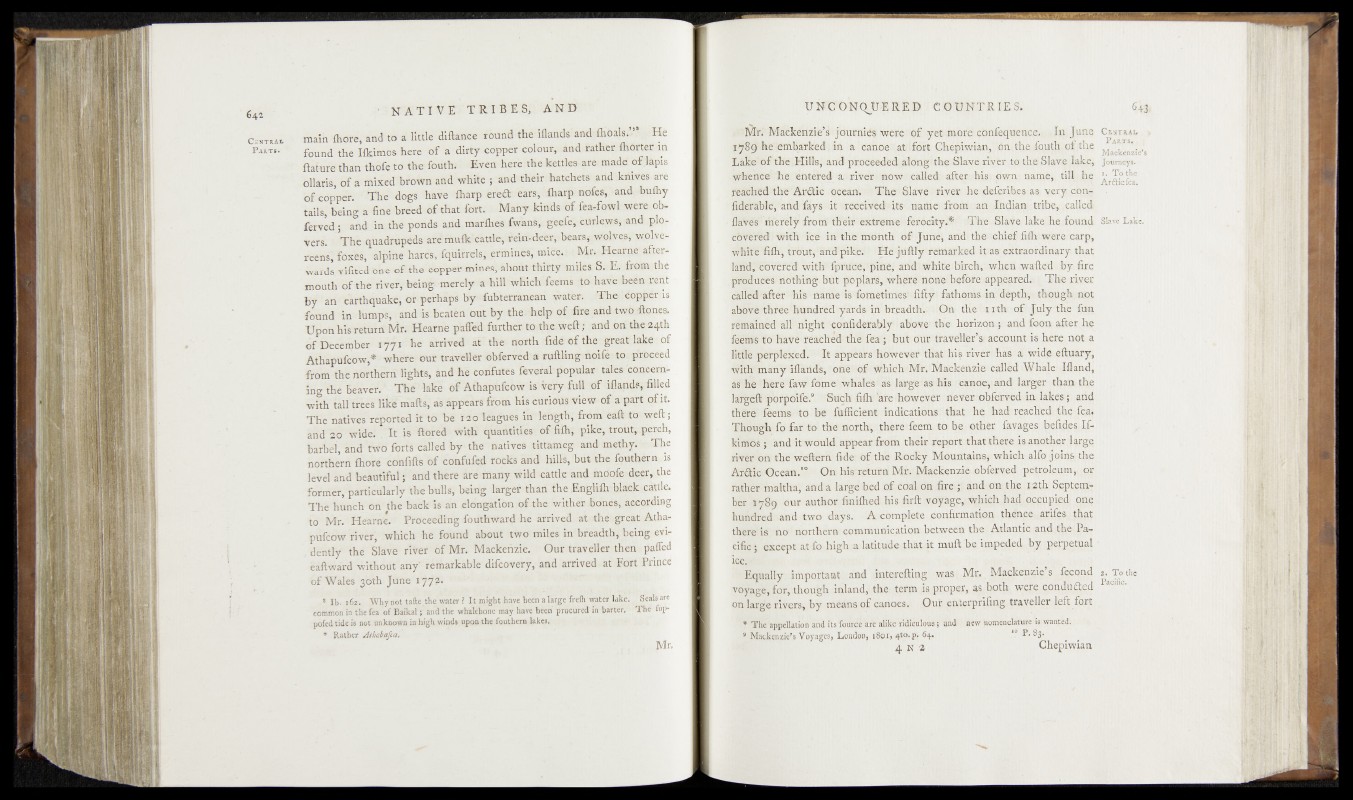
CsNtRAi main fhore.and tô a little diftance Oust'd the Mandaand- fobaistaV^He
Part*. ' the Ifkimos here of a dirty copper ’ctolour, and rather fhorter in
' ftaturé than thrife to the" foiith; : Even herbrihe kettles- are-made ofdàpis
bllatis, of a mixed brown and white ; and-their hatchets Pfft kiuveis are
of copper. * The dogs' have flharp ere£t. ears,-fharp nofes, .and?Mlhy I
tails, being a fine breed of that fort. Many kinds of fea^fowhwere-oW
ferVed ; and in the ponds and marfhes fwans, geefe^nfrriewSj -and plovers.
The-quadrupeds aremulk
reens, foxes, alpine hares, fquirrels, ermines, mice. MroHearnefâfter-
wards vifited tone of the copper mines} aboótrtfutty miles S.'E^ fro^t-he
mouth of the river, being, merely a hill whicfeTeems ^a/havVfieen^eiit
by an earthquake, or perhaps by Tubterranean water. Thaldoppèr is
found in lumps, and is beaten out by the- help of fire artd tw&#&nes.
Upon hisreturn Mr; Hearne paffed further to^tfeeWeft; «and omthe^th
of December 1771-he arrived at the north Tidé'of the great? lake ©f
Athapufcow* where our traveller obferved'sS ruftlingm®ifef>tos$ii>ceed
fromjhë northern lights, and he confutes feverabqfopiriae talèrd^prern-
ing fhebeavéri ' The'lake of Athapfi&ow is'-^ehy-fuU^'tïfién^^Ied
with tall trees likëmafis, as appears from his curious view of a part
The natives reported it to he 120 leagues in* lëîggfft,' froth eafc t^f^rft ;
aiid fsP wide; Tt is ftored with quantities of fifh, pike-, troht^pprch,
barbel, and twO forts called by the nativesJtittatn<%. and methy.'mThe
northern fhore ednfifts of confufed rocks and hill's, font the foutbérn is
level and beautiful ; and there are many wild cattle andmefoferieer, the
former, particularly the bulls, being larger than the Englifh black cattle.
The hunch on the back is an elongation of the wither- bones, according
to Mr. Hearne. Proceeding fouthward he arrived at the great Athapufcow
riverj which he found about two miles in breadth, being evi-
, dently the Slave river of Mr. Mackenzie. Our traveller then faffed I
ëaftward without any remarkable difeovery, and arrived at Fort Prince
of Wales 30th June 1772.
* lb. 162. Why not tafte the water ? I t might .have been a large frefhwater lake: . Seals are
common in the fea of Baikal f and the whalebone may have been' procured hr barter. | The fup-
pofed tide.is not unknown in high windB upon the fouthern lakes.
% .Ràther Atbabafea.
[ p r.
Mr.‘ Mackenzie’^*jbur-nie‘s -were.'tof yet more canfeqnence. In June
j7St^hd^embatekedifpp':a-'pahuei}at Ifort Gkepiwian, ’pnlthejsfoptft., of,the
Lake' of 'the jHi-lls,' and' prOceedbdv al'ortgfthe1 Slave river tsjjfchfe Slave -lake,
whence h$ fehtered a river-raoy^eali^^ripserehiss.pwn'name, til|- fie
reached the’Arfric ocean.'<-■ The« Slarvei driven heriefor-ib.es a% yery con^
fidefable, and-fays it -vreceived^it-senam© - from an- -Indian tribe, f called
flaVds^ iherely' from their extreme fei?®oi't?y^ dPhte Slaitfe laskeiheribuod
CoVb^bd\ with -fed iri?'t?Be month dff 'JUh-e3, 'and; thettohief.fifh were c-arp,
trerit, fa’ifQ^pd^- < He'^|Mlly3r®nferked it>as extraordinary that
la^f^yerdd’ witfr fprued,-pine, and | white‘birch,xwheti wafted by fire
prUdudfeSlMefe-lag but popiars, -where nonefoefbre .appeared,;, I The rivet
eMi^lfter^'bis • naI^eris^fomerim>eS^‘fifty^ fridiojm'&u'ni ‘depth, though; not
ab&Vd-three "hundred *}fa?rds.fii breadth.-.'?(©& t-lie 1 ith »qftjuly rth;e fuq
rS^ained all - night 'Confidet-ably'« abdsSek'ih& horizqnt^and foon- after he
foehtfhfo havej feacHe® the1 fte; - but ouf traveller’s; account is here not a
perplexed. S It appears'however1' that Mils rivetthas a wide eftuary,
•Withmany iflands, 'oIileHff shhich MrjMacketizi'e called Whale? »Ifland,
asdib ?h‘ere faw feme-,whales' pi laSgeias his Canoe,1 and larger-,-than, the
1 irgeteforp'oilfe.^^SS'uBb'-fifli ’are hctwe&er neveriobteirved in lakes; and
ffilke5' feemsMiOJbe fufficient 'lndfcaridhs''that he 'had r^che(|%lfhe-.fea|
Though fo far-^ th^tforthvthere'fofem, to, be other fov-ag<|s|sbefi,desvIf-
k-irMSs j and it would appear from their report that there -is apothpr larg^
riVed-W the w:eftern' fidehbf the Rocky Mountains, which alfo joins: the
Af®c^®cem.,q ’ ©h lis'return Mr. Mackenzj^-obf^yed pe^r©foupi„ or
rather inaltha, and a large bed of coal on fire ;band on tlje, 12th S^tem’-j
ber -1789 fur author finiflied his firft wo'yage^i^hiehiha^^lipi^
hundred and two days. A cbmplete ponfirmafion - th^ee.-arifes^ that
there*if’,'no!' northern!:commumc^tiQU between the-; Atlantic'.and^lie^Pa-
cific-| except at fo high a latitude that it tnuft hn ippefed- fiy jperpetual
ice, • ■
Equally important and inte-refting was Mr. Mackenzie’s^Jecond
voyage, for,-though inland,- the, term is proper, as both were cpndu&ed
on.large rivers, by means of canoes. Ouf enterprifing tr^yejler |eft foxjt
| The appellation and its fource are alike ridiculous; and ! new nomenclature is wanted. |
9 Mackenzie’s Voyages, London, 1801, 4to.p. 64. ^ ° P . 83.
4, n 2 - Chepiwian
Centrai. , ,
Parts. . ;
Mackenzie’s
Journeys. -
i. To the
Arfticfea. -
Slave Lake.
2. To the
Pacific. ' '